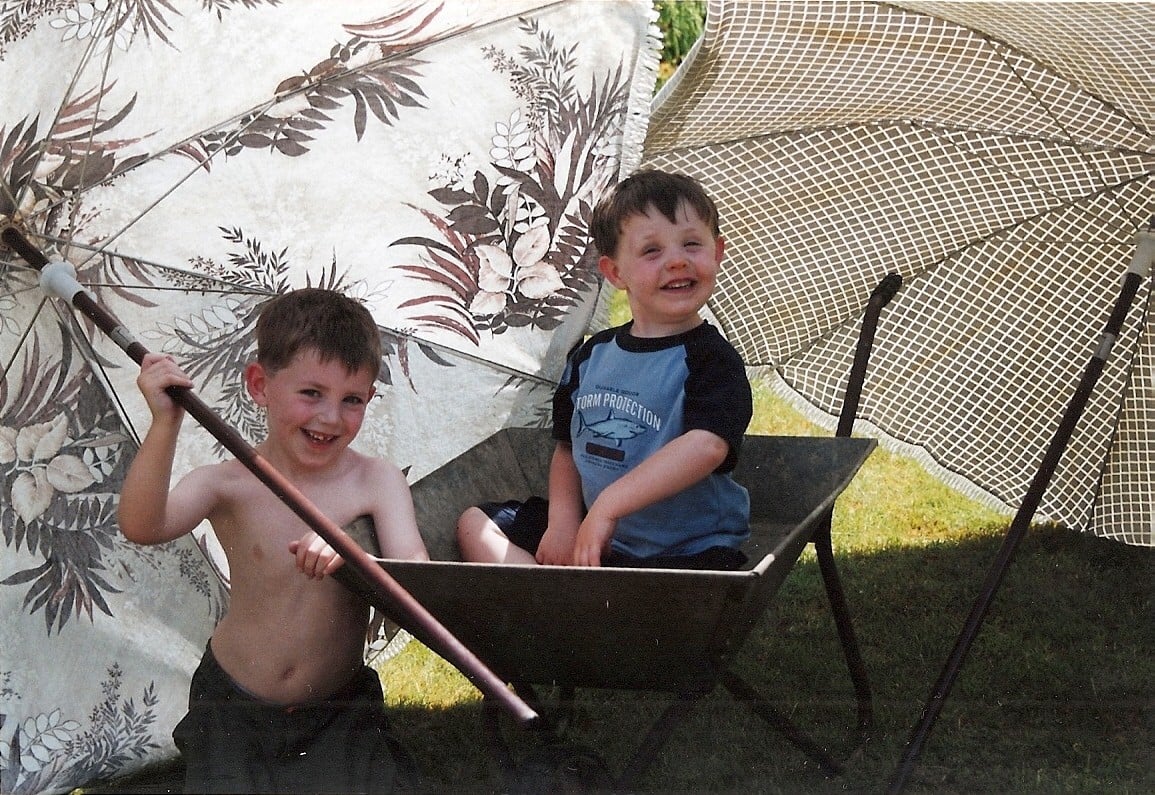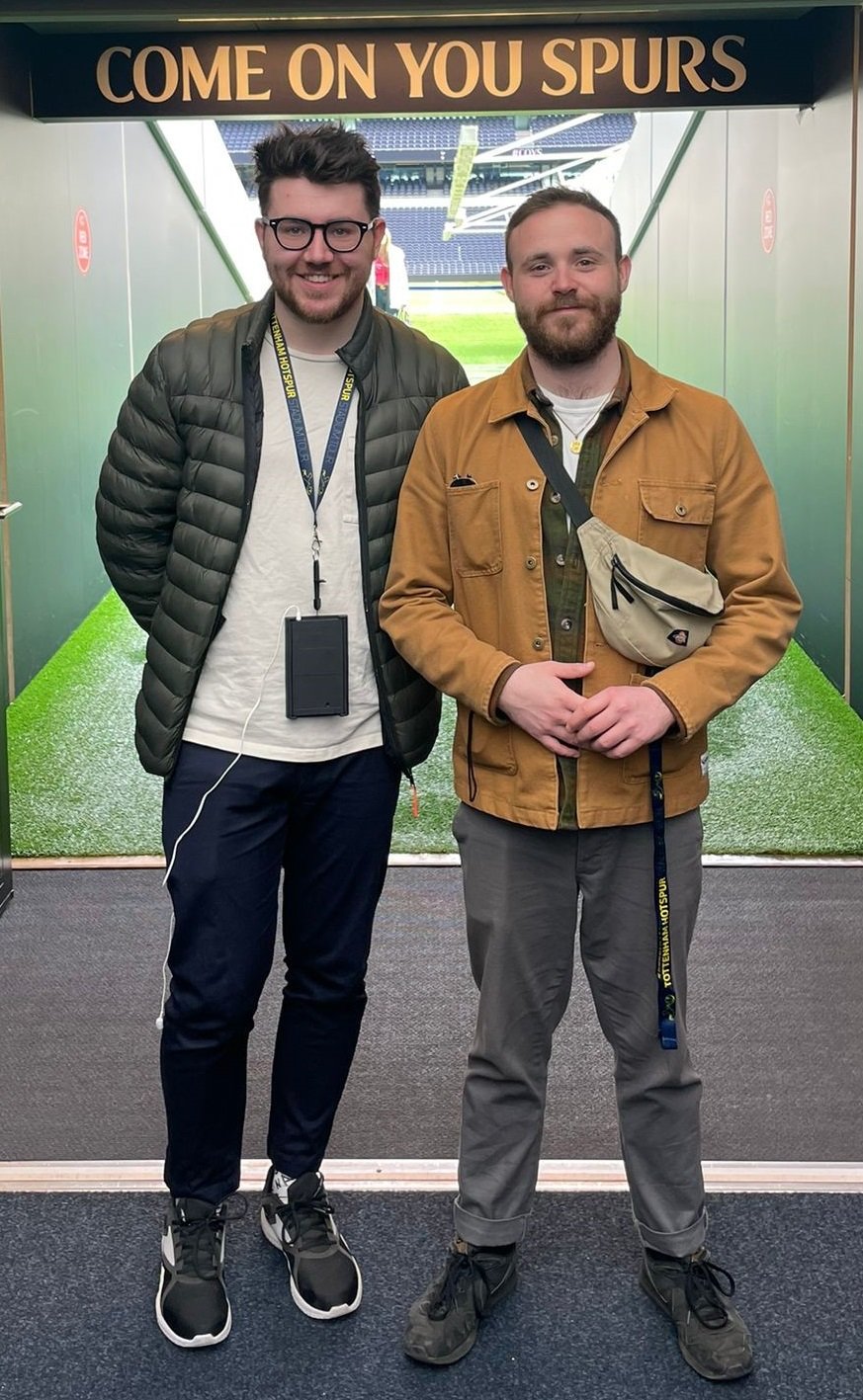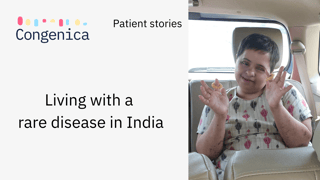Fiona Copeland is mother to two boys with the same rare disease, Primary Ciliary Dyskinesia (PCD) - a disease that she knew nothing about until the boys received results of a genetic diagnosis at the ages of six and four. Here she shares her story of discovering PCD.
Poorly babies
Our story started in 1995 when I had a thoroughly normal pregnancy with our first baby and life was good. Euan was a healthy weight and after three days in the hospital, we were sent home. He was putting on weight and hitting all his development targets but, looking back with hindsight, he was regularly getting chest infections – with high temperatures and vomiting mucus and he always had a runny nose.
He continued to meet all his development targets, but he still coughed a lot and the Health Visitor suggested we investigate why he ‘Rattled’. At 18 months he was referred to an ENT Surgeon who did a bronchoscopy to see if he had a ‘floppy larynx’ –they told us that he didn’t. They did note in his file that he had abnormal secretions on his chest, but they didn’t follow this up. We have a number of medics in the family –my brother-in-law is a GP, my sister is a gynaecologist and my father a pharmacist, but no one ever thought that the cough was anything to worry about.
Two years later little brother, Gregor, came along. I had a quick delivery with no complications, but he didn’t look very well from the start. He looked as if he had been overcooked –he wasn’t a very good colour and weighed nearly a 1lb less than his brother. We were sent home with him at 12 hours old and had a difficult night with him. He was making all sorts of grunting noises and wasn’t feeding very well. By the morning his tummy was going up and down (which I now know as intercostal recession where a baby is struggling to breath) and when the midwife arrived the next morning, she sent us straight to hospital. After numerous tests and scans, Gregor was diagnosed with pneumonia and he spent the first three weeks of his life in Special Care having intravenous antibiotics. He was by far the fattest baby in the unit as all the others were premature. He was tested for Cystic Fibrosis which was negative and the doctors assumed that he had swallowed some meconium when he was born and that was what had caused pneumonia.
Gregor was also a wheezy, vomiting baby but unlike his brother, he wasn’t hitting his development targets. He didn’t walk until he was 18 months old and didn’t talk until he was two years old. We just thought it was because he was stubborn and a bit lazy, but it turned out that he was suffering from intermittent hearing issues and glue ear, which made speaking difficult for him. We still don’t know why he was late to walk! None of the medical professionals we saw thought we should investigate these issues further.
They both continued to cough, wheeze, have earache, runny noses, and spike regular high temperatures with vomiting. I remember people used to say that they sounded as if they ‘smoked 20 woodbines a day’. Occasional visits to the GP and inhalers were prescribed but no one seem unduly concerned. We just assumed that was what our children were like.
When Euan started school, he had a lot of time off due to coughs and vomiting... he was very quiet and generally didn’t enjoy going to school. The school nurse thought that the cough should be investigated. So I trotted off to the GP and asked him to treat us if we hadn’t ever seen us before. Euan was diagnosed with asthma again and we went home with a different set of inhalers. Tracking compliance with a chart in the kitchen and bribery in the form of toys... Euan diligently took his inhaler as prescribed. Four weeks later we went back to the GP, and he finally sent us for a chest x-ray.

Euan and Gregor
Discovering Primary Ciliary Dyskinesia (PCD)
When the x-ray was returned to the GP -an urgent referral was made to the local paediatrician. The GP actually telephoned me to tell me about the appointment, which at the time I thought was ‘normal service’. Whilst sitting in the waiting room it dawned on me that this was serious. The doctor explained that Euan had all the signs of chronic lung disease. He had bronchiectasis (permanent lung damage) in the whole of his right middle lobe, a flared rib cage (Harrison Sulcus), and clubbing of the fingers where the oxygen doesn’t get to the ends of the fingers and toes. The consultant asked if I had noticed Euan had funny fingernails... I then said ‘I have two children and they both have the same fingernails‘. I then realised Gregor probably had the same problem. He explained it could have been one of three things; Cystic Fibrosis, Auto immune deficiency, although Euan looked too well for these, or this very rare genetic condition called Primary Ciliary Dyskinesia (PCD).
PCD is a genetic condition that primarily affects the tiny microscopic hairs that line your bronchial tubes. If you have PCD then your cilia are faulty and are unable to sweep mucous out of the lungs, physiotherapy helps replicate that function but patients with PCD are still prone to getting chest infections. It can also affect your sinuses, hearing, and fertility. It affects 1:15,000 people in the UK but can be higher in the Asian population with ethnic pockets of disease in areas where consanguineous marriages are prevalent - incidence can be as high as 1:2500. It is estimated that there are 3000 people in the UK with the condition.
As you can imagine it was such a huge shock that both boys (now aged six and four) were seriously ill and no one had really noticed before. CF and Auto immune deficiency were ruled out quickly and they had nasal brushings (a small biopsy taken from your nose on a miniature brush) taken at the Royal Brompton and a confirmed diagnosis of PCD approx. two months later. We learned that it was a recessive genetic condition i.e. I had a faulty gene and my husband had the same faulty gene which had caused the boys to have the condition. The boys then spent three weeks in hospital having iv antibiotics and learning how to do physio. It was a steep learning curve. However, they were so much better after the hospital stay - they were full of energy and hardly coughing at all.
Life after diagnosis
Life after diagnosis was very different. We had to quickly learn how to manage their condition by learning how to do physiotherapy and getting it into our daily routine. No mean feat getting two children to do 20 minutes of physiotherapy twice a day! We also had to start managing their medication regime, which often included intravenous antibiotics which we learned how to administer at home. Both boys had so many courses of intravenous antibiotics that their veins collapsed so both had to have portacaths (permanent access lines) fitted to allow easy access to administer the drugs. We also had to take them to all of their hospital appointments including clinics, physiotherapy and hearing tests.
Life was much more challenging for us all. Dad had to work harder to support us all as I had to give up my job to look after the boys. For the boys it was difficult to continue their ‘normal’ life with the new treatment regime. They missed a lot of school and had to play catch up academically. They also missed out on social activities with their friends because they were so often in hospital. We are really lucky to have wonderful support by our specialist hospital, the Royal Brompton and our local Milton Keynes Hospital. Nothing was ever too much trouble and the local physio even used to make the boys’ birthday cakes every year!
Getting the right support
We joined the PCD Support Group quite soon after diagnosis. We found it very useful to meet other families and learn about the condition. Soon after joining I volunteered for the charity and was the Chair for 17 years. My primary focus was raising awareness of PCD to ensure more children get an earlier diagnosis and to improve the care they received from specialist hospitals. Both of which I am proud to say were achieved.
We have been lucky to have fantastic support from our family and friends. It is sometimes difficult when you have children with special needs for your friends and families to understand how tiring it can be. Our friends have always been so happy to help –in the form of bringing around home-cooked meals, coming to London to visit the boys in hospital, and just being at the end of the phone. Even Grandma learned how to do physio.
Living with PCD
I am pleased to say that both boys are now grown up and doing well. Thanks to the excellent treatment they received as children they are now both managing living with PCD and are both pursuing their dreams. Euan went to university and is now pursuing a career as a content creator for various social media channels. Gregor, after studying at Drama School, is now an actor in London. They both still do physio twice a day, they do lots of sport and they jump on every chest infection that they get, they have limited additional damage since diagnosis because of the excellent care they have received. PCD is still a major part of their life –they both are managing to keep themselves well so that they can work and enjoy life.
New research, including drug trials, is now happening for patients specifically with PCD and there is lots of collaborative research into bronchiectasis that I know the boys will benefit from. Both boys have now got a genetic diagnosis for their type of PCD (there are over 50 genes that can cause the disease) which gives them hope that they may benefit from some of the ground-breaking genetic research that is now happening.


%20(1).png)

.png?width=320&height=192&name=Webinar%20the%20cost%20of%20rare%20disease%20(2).png)
.png?width=320&height=192&name=Patient%20stories%20(2).png)
